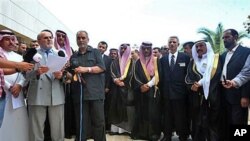Syrian opposition leaders meeting in Turkey have rejected their government's offer of a general amnesty and say they will continue to push for a regime change.
More than 300 dissidents are attending a conference in the Turkish town of Antalya on Wednesday.
Meanwhile, the Syrian government freed hundreds of political prisoners on Wednesday, a day after President Bashar al-Assad announced the amnesty. The releases are an apparent bid by Mr. Assad to appease opposition activists who have been calling for his resignation.
However, a U.S. State Department spokesman ((Mark Toner)) said the president's effort fell short and that all political prisoners need to be freed.
Also Wednesday, President Assad announced the formation of a committee that will set the framework for holding a national dialogue. State-run media quote him as saying the national talks will address issues related to Syria's social, economic and political future.
In another development, Human Rights Watch said it has reports of recent killings and torture by Syrian troops that may qualify as crimes against humanity.
The New York-based group released a report Wednesday based on more than 50 interviews with victims and witnesses of the violence.
The report centers on the southern city of Daraa, where Syrian forces allegedly carried out some of the worst violence against civilians since anti-government protests began in March.
The rights group says witnesses told of beatings, torture using electroshock devices, and detention of people seeking medical care. It called on the Syrian government to take steps immediately to halt the use of excessive force.
Witness reports in Syria, as well as official accounts, are difficult to verify independently because the government barred most international journalists from the country soon after the unrest began.
Syrian opposition activists have been protesting almost daily since March for democratic reforms and an end to President Assad's 11-year autocratic rule. Rights groups say Mr. Assad's security forces have killed more than 1,000 people and arrested 10,000 in a campaign to crush the uprising.
Some information for this report was provided by AP, AFP and Reuters.















